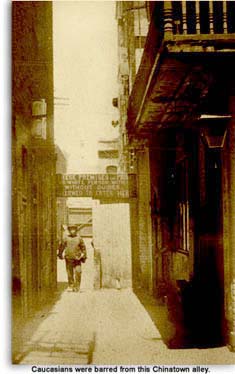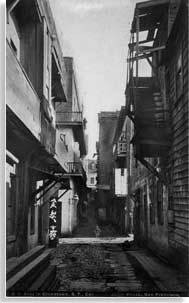Suggestions
for City Improvement
Why Chinatown has Remained Where it is.
Has not the time fully arrived
when the splendid site occupied by Chinatown should be turned to more progressive
purposes? It is pretty safe to say that all conservative, sober-minded
citizens would declare that it has. But they would insist that the work
should be done decently and in order by law-abiding processes, and without
any undue infringement of vested rights; all of which can be easily accomplished,
if only the work be taken in hand by the right people in the right way.
The trouble with the question
of removing Chinatown to a more suitable locality has always been that
its proposers have been demagogic politicians of the sand-lot variety.
The man, when elected to the Mayoral chair [Isaac Kalloch] by the sandlot
elements, issued his proclamation declaring Chinatown to be a “nuisance,”
and requiring its inhabitants to get out with their bag and baggage within
thirty days, at the end of which time the place would be destroyed as a
menace to the public health. Of course, the labor elements, living for
the most part south of Market street, and who rarely, if ever, came into
contact with Chinatown, shouted themselves hoarse.
 The Chief Magistrate of
the city had given the word, and it was not for them to question its legality.
They were ready at the expirty of the days of grace they avowed, to wade
knee deep in blood if necessary to drive the yellow peril into the sea.
The police were called in from their beats and housed in the vicinity of
the threatened danger; the militia, strongly armed, occupied the armories,
and meanwhile the law was invoked which declared the Mayor’s proclamation
to be illegal, and restrained all parties from committing any overt act.
The laborers were in earnest, but Kalloch was not. He respectfully bowed
to the decision of the courts, and the trouble blew over. The cry that
“the Chinese must go!” was the shibboleth with which the demagogues
at that time conjured the working man’s vote into the ballot box. It was
not the uncleanliness of Chinatown that they were concerned about, but
the capacity of the little brown men to work hard, keep sober, live economically,
and render their employers a maximum of service for a minimum of wages.
To terrorize the Chinese into leaving the country was the purpose of the
sandlotters.
The Chief Magistrate of
the city had given the word, and it was not for them to question its legality.
They were ready at the expirty of the days of grace they avowed, to wade
knee deep in blood if necessary to drive the yellow peril into the sea.
The police were called in from their beats and housed in the vicinity of
the threatened danger; the militia, strongly armed, occupied the armories,
and meanwhile the law was invoked which declared the Mayor’s proclamation
to be illegal, and restrained all parties from committing any overt act.
The laborers were in earnest, but Kalloch was not. He respectfully bowed
to the decision of the courts, and the trouble blew over. The cry that
“the Chinese must go!” was the shibboleth with which the demagogues
at that time conjured the working man’s vote into the ballot box. It was
not the uncleanliness of Chinatown that they were concerned about, but
the capacity of the little brown men to work hard, keep sober, live economically,
and render their employers a maximum of service for a minimum of wages.
To terrorize the Chinese into leaving the country was the purpose of the
sandlotters.
Our Civic Authorities
Recreant to Duty.
Naturally enough these experiences
for a long time caused every suggestion for the removal of Chinatown to
be viewed with suspicion. But the time has fully come when the further
development of the city demands that the section in question shall be turned
to higher and better purposes. It stands athwart the march of progress.
It impedes the city’s extension in a very important direction. The residents
and property owners of North Beach, and of the very best residential portions
of the Western Addition want it out of the way. Above all, business men
are ready to buy up the area which Chinatown now covers at a reasonable
rate, replace the present rookeries with first-class structures, and make
the locality what it ought to be, a thriving, presentable and prosperous
center of commercial life.
No man’s property should
be taken from him without due compensation being first made therefor; on
the other hand no man should be permitted, out of pure wantonness, to stand
in the way of a great and needed improvement. If any such men own property
in the objectionable district, the city has abundant power to deal with
them if only the law be invoked in the right way. We have no desire to
make too much out of the fact that Chinatown is unquestionably reeking
with filth and germs of disease, because that is the fault of our civic
authorities, who have all the necessary powers to make and keep Chinatown
as clean and healthy as any other portion of the city.
 For
more years than we care to recall, there has been politics in keeping the
Chinese and their dens in an obnoxious condition. When the plague threatened
to reach our shores if it did not actually reach them, as the greatest experts
in the land declared it did, it became a supremely important precaution
to clean and fumigate Chinatown. The plague had at the time reached as
far across the ocean as Honolulu, and was raging in the Chinese quarter
of that city. The Chinese had to be removed to a distant camp, and the
authorities then thought it necessary to utterly destroy the quarter by
fire. Our local Board of Health, with a discretion that it would have been
criminal not to have exercised under the circumstances, ordered a thorough
cleansing of Chinatown.
For
more years than we care to recall, there has been politics in keeping the
Chinese and their dens in an obnoxious condition. When the plague threatened
to reach our shores if it did not actually reach them, as the greatest experts
in the land declared it did, it became a supremely important precaution
to clean and fumigate Chinatown. The plague had at the time reached as
far across the ocean as Honolulu, and was raging in the Chinese quarter
of that city. The Chinese had to be removed to a distant camp, and the
authorities then thought it necessary to utterly destroy the quarter by
fire. Our local Board of Health, with a discretion that it would have been
criminal not to have exercised under the circumstances, ordered a thorough
cleansing of Chinatown.
Our readers know how the
Board, for doing its plain duty, was encountered with all possible obstacles
and abuse, and how when the sandlotters had elected a fiddler in a theater
orchestra Mayor [Eugene Schmitz] of the city he ordered the distinguished
physicians who constituted the Board of Health removed from office, and
how they are still fighting in the courts to retain their places, with
every chance of success.
The Chinese
Merchants Would be Willing to Move.
But the Chinese question
is settled now. The labor elements have had their way, and Congress has
renewed the Exclusion Act. There is no longer any use in keeping Chinatown
as a sort of red herring to trail under the noses of visiting Congressmen.
Having served its purposes, be they good or bad, this should be a good
time to discuss its removal. A new site being first determined upon, it
would remain for the City Fathers to condemn the present one, giving sufficient
time to effect removals. Once give the Chinese merchants to understand
that a locality has been named for the use of their people, and with their
quick eye to detect a good investment, they might be safely trusted to
buy up the lands named, and provide buildings such as their countrymen
delight to occupy.
The Chinese merchants should
by no means be lost sight of as an important factor in securing a new Chinatown.
If they were taken in hand in good part and in good faith, there is no
reason why they should not be induced to come into the project with alacrity.
It ought not to be difficult to make them understand that our people are
determined to use the site of Chinatown for the betterment and extension
of the city, and that better protection can be afforded the Chinese elsewhere.
In any event, Chinatown has got to be reclaimed and made a business section
of the city. Let us make up our minds to do that, and then a way will be
found to accomplish our purpose.
We need the Chinese, but
we do not need Chinatown in his present condition or location. The Chinese
now have one of the best parts of town, and they have forfeited their right
to it by their habits of life.
San Francisco News Letter
August 30, 1902
See: Attempts to move Chinatown after the 1906 earthquake
Return to top of page